When I was younger, I often felt self-conscious and socially awkward. In fact, one of the reasons I wanted to become a Behavioral Scientist was to be better socially.
If you often feel anxious and embarrassed, this guide is for you. It will give you the tools you need to be more relaxed in social settings, get out of your head and into the conversation.
This guide is for anyone who’s feeling overly self-aware, but examples are geared toward adults in work or at college.
Note: Sometimes, the underlying reason for self-consciousness is social anxiety. If this is the case for you, here’s our list of the best books on social anxiety.
Let’s get started!
1. Focus on someone or something
Self-consciousness comes from being overly concerned with how people see us. We worry that we won’t be seen as smart, attractive, or that others are judging us.
It can be exhausting, and with too little evidence to support the argument in either direction, we go straight to the most negative conclusion.
To get out of this pessimistic mindset, try shifting your attention to the people around you and your environment.
Focus not on what others think of you but on learning about the people you’re with. Make it a point to find out one thing about every person you meet. It could be their job, their major, or what they did on the weekend.
The objective is to get out of your head. Put that energy into the people around you rather than into feeding an inner dialogue that’s holding you back.
2. Question your inner critical voice
It’s easy to believe the negative voice inside our head is always right. But have you tried questioning it? You might find out that it has little to do with what’s real.
Check the evidence from your life:
Can you recall a time you did something that proves your inner critic wrong? For example, if your voice says, “I always mess up around people,” remind yourself of a time when you did just fine.
Ask yourself if what you are feeling is reasonable. Or, are you letting a perception you think others have of you, run the story in your head?
3. Know that people notice you less than you think
In an experiment, students were asked to wear an embarrassing t-shirt.
By the end of the day, the students who wore the shirts estimated that 46% of the class had noticed. When polled, only 23% of their mates actually had.[1] In other words, their embarrassing t-shirt was only half as noticeable as they had thought.
What feels mortifying to us is usually having little to no impact on others. People are caught up in their own thoughts and struggles, too busy to worry about ours. The best thing we can do is remind ourselves that no one cares as much as we do, and even our own filter is not a perfect lens.
4. Know that it’s OK to say some stupid things
I remember talking to a girl I was crushing on when I was in high school. She was talking about how her brother liked a band, and like a crazy person, I said, “Ya, I know.” Like somehow, I knew what group her brother liked. My crush looked at me strangely but kept going.
Did it make any difference to my crush? Not really. At this point, I can laugh about it, but at the time it felt humiliating.
Try turning the tables on the situation. Would you care if someone blurted out something silly? Or would it just pass you by without giving it extra thought? It’s better to talk freely even if you say something stupid every once in a while. The alternative is to always guard yourself, and that can make you come off as stiff and aloof.
5. Don’t try to fight your feelings
Emotions tend to cling harder when we fight them and weaken when we accept them.[2]
When you are anxious, and feeling uncomfortable in a social setting, what are you thinking about? How does thinking about that make you feel? Happy, sad, nervous, jealous? What’s your body doing when you’re in your head and feeling awkward at a party? Are you sweating, jumpy, yawning a lot (a reaction to nerves)?
Simply accept how you feel rather than trying to change it.
Now focus outward. Talk to someone. Ask them how they’re doing. What brings them to this party/event? Do they know anyone? Then check your head. How do you feel when you’re talking to someone? Do you get any less nervous as the conversation goes on? If you were blushing, has it subsided yet?
Practice going back and forth between your inner thoughts and how you feel when you are talking to others. See if you feel better when you’re in your head, listening to your internal dialogue, or when you’re spending your energy on others.
6. Focus on your positive traits
This isn’t “think happy thoughts, and you’ll be fine.” Instead, you want to base your self-worth on your real, positive qualities rather than cynical and questionable self-talk. This is what we know is true:
- You have talents and abilities that give you fundamental value.
- This combination of characteristics makes you unique and memorable.
- You are worth spending time with and knowing.
Try to list your concrete skills like your mathematical ability, you’re a good writer, you’re multilingual, you’re a great cook. Then there are your personality traits. You’re kind, honest, genuine, funny, enthusiastic, etc.
Even if you can’t make a full list today, write one positive quality down every day and then review the list every week. When you have a comprehensive list, read it every day. You’re training your mind to focus on what you do well and to be able to access it quickly.
7. Make sure you’re reading the situation right
Negative experiences can teach us to be on guard and defend ourselves from criticism and hurt. This can affect how we perceive the world and the people we encounter.
Those of us who are overly self-conscious might believe the world will judge us harshly because that is what we’ve experienced. However, as I’ve pointed out, people don’t care that much about how we act or what we say. Every new person you meet thinks of you as a blank slate.
When you’re in a scary social situation, ask yourself, “Is there a chance my past experience is affecting how I’m seeing this interaction? Is there another, more realistic way I can approach his conversation?”
Believe people will be friendly, and most of the time, they will be. If not, it says more about them than you.
8. See yourself as a social observer
People watching is fascinating, and it shows us how our basic humanity makes us all messy, foolish, and funny. Go to the mall, grab a coffee/tea, and watch people walk with their friends. Listen in as they sit beside you and talk, or as they chase their kids down the hall.
Now notice their body language, their tone of voice, and eavesdrop on what they’re saying. What we’re doing is training you to switch your focus from yourself to others and to think objectively about what you’re witnessing.
Are people relaxed or stilted? Is their posture good, or are they slouching? When they talk, are they quiet, or does the volume go up and down with excitement? The more we see others being their imperfect selves, the more we’ll realize this is what ‘normal’ looks like.
Go into this observer mode when you walk into a room of strangers. It can help you be less self-conscious.
9. Assume that people will like you
This one is about the mechanics of being seen as confident rather than inhibited or self-conscious. When we feel uncomfortable, it can make us talk softer, hug our bodies with our arms, and speak faster to get the words out and move the focus off us as soon as possible. It can make us seem aloof, and even if we don’t intend to, it makes us less approachable.
Be confident and friendly right off the bat. Walk up to people with a warm smile and present yourself. If you’re uncertain about the details, look at how likable, confident people do it and learn from them. Assuming people will like you is a self-fulfilling prophecy. Assuming they won’t is, too.
10. Ask about others to take the focus off you
It’s easier to focus on someone else other than ourselves. When you meet someone for the first time, ask them what they do for fun. What are their hobbies, or do they have any pets? Listen carefully, nod, and give them signs that you are enjoying their story. Then add anything relevant that applies from your life. Things like your pets – what kind are they, their name, breed…or your hobbies. At the end of the day, you want to have a balance between learning about them and sharing about yourself.
The goal is to learn about someone else because it’s hard to be self-conscious when you’re focused on getting to know another’s interests and stories.
11. Make internal progress checks, not comparisons
Jealousy is a miserable emotion. It makes you feel small and worthless and sucks the joy out of everything. It’s like anger directed at someone else, but you are the one who feels crappy.
Avoid both overexaggerating someone else’s talents or trying to find flaws in them to make yourself feel better. No one is perfect, and tearing them down when you feel envious just retains the focus on you because you are still comparing yourself to someone else.
Here’s a thought: What if we were OK with the fact that someone is more accomplished than us? When we accept this, it helps us see ourselves differently.
Our value then has nothing to do with how successful we are or how good we are at something. We want to go from “I like myself because I’m good at…” to “I like myself.” (Period.) This makes our self-acceptance unconditional.
How do we accept that others are more accomplished than us and be OK with that? First, let that fact sink in, and allow all your emotions of envy and sadness to come to you. Accept those emotions rather than fight them. Now, you no longer need to fear them. Afterward, you will be less prone to comparisons.
Here’s another way to do it:
Instead of thinking, “Well, at least I’m better than them when it comes to X.” Say, “I’m not good at everything, which is OK because my value isn’t based on my achievements. I have value because I am 100% myself”.
Let’s talk more about how to be more self-accepting…
12. Practice accepting yourself
Self-acceptance is one of the biggest steps we take towards achieving self-confidence.
According to Aaron Karmin, MA, LCPC, a psychotherapist in Chicago, Ill, a person “who accepts [themselves] unconditionally as a worthwhile human in spite of [their] faults and imperfections does not experience the stress of self-consciousness.”.[3]
Here are some things you can do to accept yourself:
- Decide how you are going to live your life. Will you let others define your personal image, your strengths, and your weaknesses? Try to move from blame, doubt, and shame to tolerance, acceptance, and trust.
- Make a list of all your good points.
- What do you do well?
- What are you proud of accomplishing?
- Whose lives have you made better?
- Connections you’ve made with others.
- Hardships you have overcome.
Review the list often, so you see your progress and acknowledge your gifts.
- Take an inventory of the people close to you.
- Are they good for you?
- Do they reinforce negative self-talk?
- Do they criticize or demean you?
Consider eliminating all the negative influences in your life.
- Surround yourself with a positive support group of people who celebrate you.
- Forgive yourself. If you made a mistake, realize you did your best with the information you had at the time, or you simply made a bad choice. But now you chose to move on and forgive yourself.
- Silence your inner critic. Just because it’s hard to hear doesn’t mean it’s right or 100% true. If you wouldn’t talk to someone else like you speak to yourself, why is it OK to do it to you? You’re human like everyone else. Treat yourself as well as you treat anyone else, if not better.
- Move on from your unrealized dreams. You can’t change the past. All you can do is move forward and continue to pursue your current goals.
- Help yourself see how you make others’ lives better. It’s harder to see yourself in a harsh light when you acknowledge all the good you do.
- Let it go – You can’t control everything. It’s not resignation. It’s a realization that your energy is better spent elsewhere instead of railing against the things you can’t change.
- Try to solve your problems one at a time. First, step outside your head where all the worry and self-doubt resides. Take a dispassionate look at what you need to do to move past each issue. You could even try imagining that the problems you’re facing are someone else’s (if that helps you get away from your internal thoughts). Ask yourself what advice you’d give them (yourself) to help?
- Practice Self-compassion – accept your flaws and love yourself anyway. Simple words, but for most of us, it takes years, if not a lifetime to master this step. The more you do it, the better you’ll get in every respect.
- Even though you may not have much experience being kind and compassionate with yourself, you will start to believe these good things you’re telling yourself. Especially if you keep this positive internal monologue up. In many instances, it took years to get to this place of insecurity. It will likely take weeks and months to see progress and make permanent changes to your mental habits.
13. Practice thinking about other’s needs
Try doing thoughtful things for others. Consider their struggles, worries, dreams or regrets. When you do, you take the focus off yourself and you’ll connect with them. This will help you be less self-conscious.[4] It will also show others that you are caring, and you value them. Done selflessly, it will bring good things back to you.
Here are some suggestions:
- Smiling at someone after you meet them. It could be a friend, family member, or acquaintance. Let the smile happen as you talk to them, so they know you are smiling just for them because it grows after you say, ‘Hi.’
- Hold a door for someone.
- Give a spontaneous compliment.
- Bring a friend or co-worker cookies or a pre-made dinner if they are sick or need a pick-me-up.
- Pay it forward. Pay for the coffee or drive-thru meal of the people behind you.
- Keep your area tidy and organized if you work in an open-concept office.
- Send cards for different occasions or for no occasion at all.
- Give someone 100% of your attention and note what they say so you can follow up later. (Ask them how ‘it’ went. Make sure they are OK afterward.)
- Consciously spend a few minutes every day thinking of the things you are grateful for.
A word of caution: Do not do these things to gain others’ approval. That puts the focus back on you. Do it out of sincere consideration for others. The purpose of the exercise is to focus on others and their well-being. When you do, you’ll become more compassionate and less self-conscious.
14. Consider talking to a Therapist
If your self-consciousness is inhibiting you or is a result of social anxiety, a therapist can be helpful. Having social anxiety is more common than we think, and deciding to understand and address the effect it has on your life is brave. A Psychologist or a Therapist will help you talk through your feelings, find out where they originate from, and give you the tools to unpack them and move forward.
We recommend BetterHelp for online therapy, since they offer unlimited messaging and a weekly session, and are cheaper than going to a therapist's office.
Their plans start at $64 per week. If you use this link, you get 20% off your first month at BetterHelp + a $50 coupon valid for any SocialSelf course: Click here to learn more about BetterHelp.
(To receive your $50 SocialSelf coupon, sign up with our link. Then, email BetterHelp’s order confirmation to us to receive your personal code. You can use this code for any of our courses.)
You can also try contacting your insurance company or doctor for recommendations.
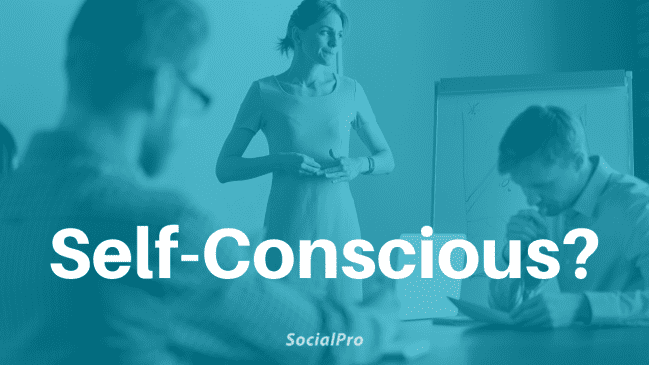
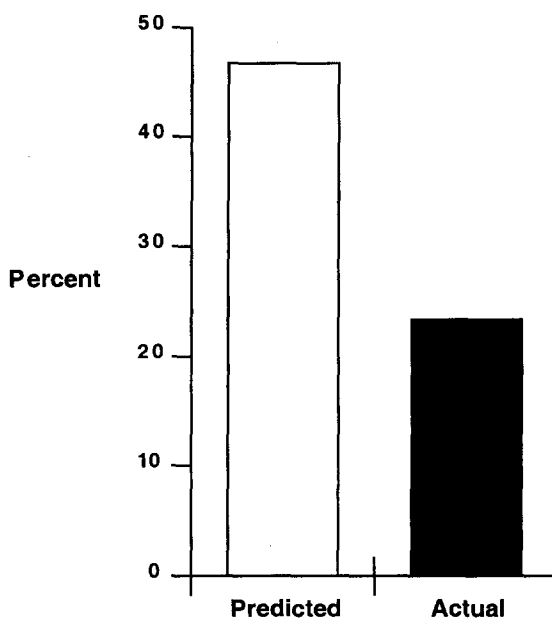




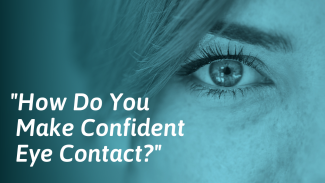
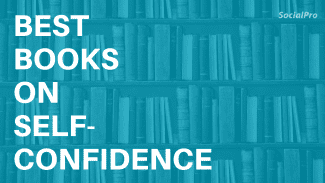
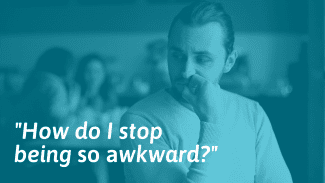
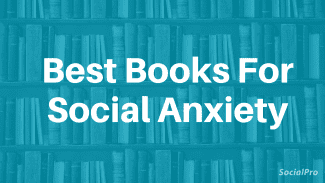
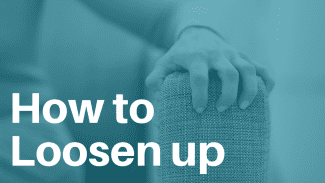
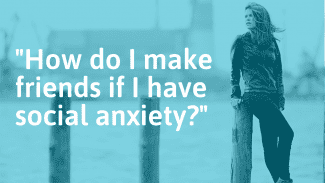
I feel I am less interesting and fun to be around compared to my friends… this makes me withdraw from most conversations with people because i have this self image that I am not interesting and not worth talking to so I will just be silent most of the time
I have a similar experience
Am afraid of speaking English language because I found it difficult to pronounce some words and how to be fluent with it.
Same for me, it’s makes me so anxious that I forget english words, and I cannot really improve my language skills, because of my miserable social skills.
When I started college, I thought everyone was cooler than me. One girl in particular looked so cool – Joan Baez style long black hair in a single braid and always dressed attractively – I had no idea how to present myself at 19. The funny thing was, we had a mutual friend a very down to earth young woman who was a little older than us both, who was one of the few people I managed to retain as a friend into adulthood – sadly she died young. I mentioned once when we were reminiscing that I had always felt scared of Jane because she appeared so “cool” and inscrutable my friend replied -“she was scared of you too.” Even at my ripe old age and with insights like this one – I do try to make more effort to go halfway but I have struggled all my life and still do with notions that I don’t fit in, that I have to try to please people all the time, that people are going to judge me.
I am afraid to get tradespeople to do maintenance jobs because they will sense my fear and do a bad job, overcharge me and generally despise me as either a weak person if I didn’t query anything at all or a fussy old woman if I did. I know intellectually that it is an irrational fear but nonetheless it makes me hesitate to pick up the phone unless I am feeling very strong that day. I recently bought a second hand car out of necessity but felt a bit railroaded by the car dealer – it was the first time in my life of buying a car on my own. I was afraid to drive it much until I subconsciously allowed the warranty period to run out (i.e. I did not even check to see exactly on what date it ended or what was covered,) as I was afraid of having to go back and complain about something. Basically I preferred to just pay for any needed repairs myself, but this was an easier prospect once the possibility of evoking the warranty had ended. The underlying program is that I cannot possibly make a good choice or decision by myself – so, often, I make no choice and stick in the rut.
I feel like I’m awkward and not funny even though I think I am…?
I always feel am not smart,am ugly to be with others and maybe I don’t understand the language they’re using
When I feel anxious around others I find it difficult to communicate with ease. I stammer my words, find it difficult to connect my head to my mouth, forget what to say or just freeze. It’s frustrating.
Can we be friends please
sure
Same here. In my quiet time, I sometimes speak to myself and am proud of the reasonable tins I say but wen am conversing with people am just blank
I am afraid of people judging me by my looks and my medical problom
I am always scared that my jokes and humour will not be understood. Because of that, it is not possible for me to have fun with other people unless they are my closest friends.
I relate with that a lot too. Whenever I do say something that I think is funny, I get so relieved when people laugh. When they don’t, I wonder if they think I am weird or if they don’t like me or if they are thinking about going away from me or if they don’t understand and I need to explain why it’s funny… ye I’m an overthinker too if u couldn’t tell…
0n surface I look like a great guy whos got it all together smart and put together but inside im very afraid every time i walk outside what will people think of me and when i meet a stranger i get very anxious. if i meet a stranger when im with somebody then i clam up and let them talk together.i CANNOT for the life of me speak in public which puts me in embarassing situations. when i see someone in the street who i semi-know i try my best to avoid them. i really need to change quickly in order to lead a healthy life and reach my potential
I really fear being judged for not having much in the way of friends.
SAME. I’m always so scared that people won’t like who I am if I truly show it. I so get you.
All of my friends speak very eloquently, and I do too, but I never feel like it. I always want to seem perfect and speak in a manner that will make people think “wow she is so intelligent”. So when I have a tendency of stumbling over my words, or forgetting them, or worse, making minor grammatical mistakes, I just judge myself for it. I feel like I can’t speak well enough, so I often just stay silent. I’m also afraid of people thinking I’m too enthusiastic or passionate, or that I’m not funny. Just a whole bunch of thoughts that I know are not true, but keep tiptoeing their way back into my mind.
I used to have this problem when I was younger at school, but quickly overcome it when I become aware the world is a very big place – and it’s good to know all sorts of people from all walks of life. Later I made friends all over the globe, with different ages, backgrounds, and aspirations. Then I went back to old friends. That was interesting. I wondered why I ever had an issue, because if they couldn’t accept me for who I am, then they were the ones going to have serious problems getting into the real world. Let me know how it goes. Happy to talk.
A lot of the time I cant think of anything to say during conversation (or something that is interesting/can keep the conversation going) and I am afraid that people will get bored of me or think I’m not interested in talking to them, or I won’t live up to their social expectations. Adding onto this fear, I’m not good at starting or continuing conversations online, maybe because it gives me more of a chance to overthink everything since it’s not as natural of a situation, and I’m almost always too scared to ask any of my friends to hang out or to actually open up and get close to them.
When I walk or just stand with a bunch of people, I focus too much on how I’m walking or standing, how should my hands and legs be… Also when I interact with some stranger, even if for like one minute, I get SO uncomfortable! Even in school if I know a answer and other students doesn’t, I tell it to my friend and they tell it to the teacher and get the credit… yeah… Also if I’m super sure of the answers sometimes I’ll still just say it in a super low voice no one can hear 🙁
My biggest insecurity is i am afraid to start conversation, neither English nor swedish is my first language so the less i meet new people the worse my fears get. I do have friends but it takes very long time for me to get out of my shelter.
I am not sure as to what to say when talking amongst strangers. I feel as if I would utter something that would not make any sense and in the end leaving me feeling very stupid. My biggest problem is starting up a conversation because most of the times I barely have anything to say and I fear that they may find me uninteresting to b around.
Am having the same issues
I’ve always suffered anxiety but took medication for it but about 2 years ago I had personal issues and my anxiety just went through the roof,like you say find it hard to talk to new people .don’t have any close family I have 3 children but we’re not all close and apart from that I’m alone .I don’t even know where to start to get a life back .I go to bed very early at night im just what I call myself unsociable because it’s easier than putting myself out there I don’t know how to start to be what I call normal and confident like I was when I was young thank you Shirley
I’m afraid of talking in front of public, especially people that i don’t know well. It affects my performa on my collage, i always get scared to ask and answer question, and i think it’s one of my social problem.
I have always had anxiety, social anxiety and ocd. My first episode of social anxiety was when I were 4 years old. I was afraid to tell a friend that I liked someone, because I understood she didn’t like the person and I was afraid of the consequences. I have always struggled to make friends. I didn’t understand the social codes, how to make a connection with someone. I don’t have any friends from childhood. When I make friends I always choose the wrong ones. I am a afraid of attention both positive and negative. I never act naturally, because in my mind I have so many scenarios in my head so simply greeting someone becomes an awkward situation. My family was always critical og my so I have no confidence. I am very critical of myself, I keep thinking what will other people think of me, and that’s stops me from doing what I want. I always think people won’t like me, so why even try. I feel like I stand on the outside og society looking in. I have been afraid to take actions that will make me happy, because I am so afraid I’ll fail. I have a few good friends know, but I would like to make more friends. Have a normal life. I work in a nursery. I love my job and have great connections with the children. When I speak to their parents I can become very ridged. I have worked with children over 15 years. The parents have always excepted me being very quiet when I great them, I always managed to make a connection until this year. The parents have complained that I’m to mechanical when I greet them in the morning and in the afternoon. I thought I talked like I have always done, but they do not like how quite and reserved I’am. I like to keep my job because like working in a nursery. I don’t want my social anxiety effect my job. I want to be more relaxed when I speak to the parents. I want to make a good impression. I went to a psychologist and group therapy for many years, but progress has been very slow. I would like to manage the art of small talk make connections. I would also like to stand up for my self without being to emotional, and be strong enough emotionally to be around people I find difficult or have been nasty to me. I would like to be a normal person who does what she likes and doesn’t care what other people would think. I don’t want to be afraid to every single time I meet someone.
I’m afraid of being judged for being to poor to get my teeth fixed. Practically toothless, only 8 teeth left, but can’t afford to do nothing about it. I feel I have an ugly smile. This is embarrassing.
My social anxiety shows mostly at work. There are many times I replay a conversation in my head and be hard on myself on how I responded in the conversation such as “Did I talk to much?” “did I sound rude?” “Did I make sense?” “I’m not sure if this person likes me anymore because of what I said”, “did I speak too fast?” Etc. I’m hopefully my confidence increases at work and I can stop being hard on myself
I can dress up real nice and masculine but girls look the other way when I walk near as if they are thinking the same thing I am thinking…
“that good looking babe has a boyfriend for sure so I won’t bother her”
She’s probably thinking “he is cute but probably is a player and is crazy AF”
I often have to say outloud “everyone has toxic self talk no one is exempt”
I have the fear that I may look dumb will communicating with others like I don’t make conversation interesting or I ask some uncomfortable question and make a interesting conversation to a boring one. I also don’t have much opinion of my own on many things which makes very hard to keep conversation going.
Im afraid people will judge me based on my poor life decisions. That they will think Im some weirdo, or that I’m extremely dull and boring. Im afraid of my dark past, and sharing horrible things about my childhood that no one will understand. I grew up extremely poor, and homeless. It wasn’t my fault my mother put us in the situation. She was doing the best she could. She couldn’t find a job, and didn’t qualify for unemployment. I never blamed her like my siblings for our misfortunes. I was always embarrassed to tell the other kids at school that I lived at the homeless shelter. I had friends but I wouldn’t get close to anyone. I was afraid to invite people over to a shelter, I was afraid that they would laugh at me. At 13 me and my siblings moved into a stable home. But we were never allowed to bring anyone home, so I never got to experience close friendships. I graduated high school early and went into the military, but my past was so dark that I never truly got close to anyone later. My ability to not open up and my fears are keeping me from having good friendships, and a real relationship. Im 29 years old and I never had a boyfriend. Just guys that I liked. I want to have close friends i want to have a relationship, but I have to get past this anxiety first.
Wow, first time on this forum, it was a relief just to read the other comments. I feel less crazy just knows there are other people struggling with the same things I do.
I have a pretty bad speech impledament. It comes and goes. My first impressions are always pretty bad. At first people talk to me normaly. Then after i speak they way people face expression change along with the tone in there voice changes and start talking to me like im a little kid. I’m a decent looking man. I’ve been a manager and was in charge of setting up muti million dollar convention shows have had 50 people I had to manage along with other things where i had to be social. Did that job over 10 years i lost alot of my life cause of that demanding job. Now im a sales associate at a convenience store grave yard. In a bad part of town i mostly deal with the kind of people that most people avoid…. Drug addicts hookers homeless. Most people wouldn’t come there at night……first 6 months was hell once i got the worse of the worse its still got its riff raff but alot more people feel comfortable coming there at night now. But anyways when i open my mouth to speak to someone new there body language change and they think I mentally challenge i dont like that. Most of the time people would be talking and my mind goes blank cause most of the time i have nothion for the topic of conversation that most people talk about. And when it comes to women once they realize who i am I’m already in the friend zone. I go thou alot different anixtys then most. Why does my mind always go blink? I listen to there words and find myself thinking okay what do i know or dont know about there conversation. Like with me it’s easier for me to talk to random people at work then it is outside of work cause i have no clue how to set up a reason to hangout or to even talk to them out side of work…. Like right now one of female friends from 20 years ago came in one day I didn’t recognize her at first and she recognize me. We couldn’t talk at the time but she gave me her phone number and we talk for over 5 hrs on the phone. I went to her house had a few beers nothion happen sleep in same bed just cuddle and went to sleep. And now she won’t even return my phone calls
I feel at the end we all share exactly the same problem
I feel that a certain healthy balance is missing in my life.
I’m afraid that I will have missed living when life will be over one day.
I used to isolate myself because a lot of people I knew were not people I wanted to hangout with. My father always had a problem with almost all the people I tried to make friends with. It just felt better to always be indoors, I did not know that would affect me the way it did. I’m still struggling with social anxiety, for a long time I got used to being anxious in social settings. Most of the time I’m afraid to talk and be with other people because I’m afraid of being judged.
I am judged for my physical appearance as I’m fat
People think I’m rude as I have a husky voice
The vibe doesn’t feel right of certain ripple due to my overthinking
People emotionally play